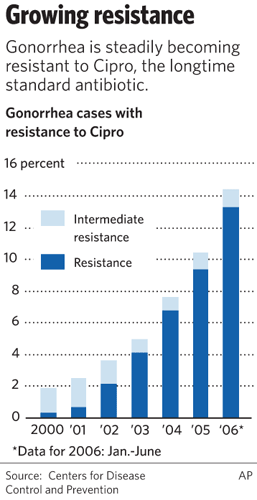Gonorrhea gains resistance to drugs

The Associated Press
Apr 13, 2007
Last updated on May 12, 2016 at 09:51 a.m.
ATLANTA – The sexually transmitted disease gonorrhea is now among the “superbugs” resistant to common antibiotics, leading U.S. health officials to recommend wider use of a different class of drugs to avert a public health crisis.
The resistant form accounts for more than one in every four gonorrhea cases among heterosexual men in Philadelphia and nearly that many in San Francisco, according to a survey that led to Thursday’s recommendation by the Centers for Disease Control and Prevention.
Gonorrhea, which is believed to infect more than 700,000 people in the United States each year, can leave both men and women infertile and puts people at higher risk of getting the AIDS virus.
Since the early 1990s, a class of drugs known as fluoroquinolones has provided a relatively easy cure. These antibiotics, taken as tablets, include the drug Cipro.
Get The Daily Illini in your inbox!
But a growing number of gonorrhea cases is resistant to those drugs, and officials at the CDC for the first time are urging doctors to stop using fluoroquinolones and switch to cephalosporins, a different class of antibiotics, to treat everyone.
“Gonorrhea has now joined the list of other superbugs for which treatment options have become dangerously few,” said Dr. Henry Masur, president of the Infectious Disease Society of America. “To make a bad problem even worse, we’re also seeing a decline in the development of new antibiotics to treat these infections.”





